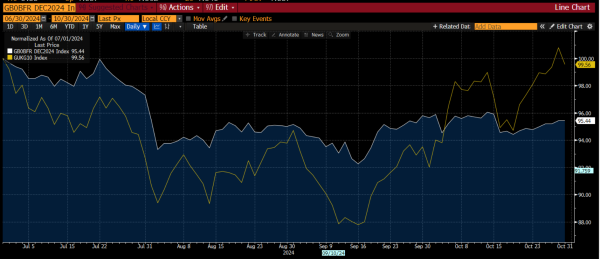UK bond yields recover ahead of Budget
UK Budget Count Down
It’s a packed schedule for financial markets on Wednesday. We have euro area GDP; a raft of corporate results and the centre piece is today’s UK budget. As we lead up to the Budget, stock markets in Europe are broadly lower, however, the bond market rout that saw European and US bond yields jump on Tuesday is currently in reverse, and the UK Gilt yield is down some 6 basis points in early trading. The UK’s 10-year Gilt is outperforming its European counterparts with just a few hours to go before Rachel Reeves’s first Budget, scheduled for 1230 GMT. Is this a sign that the bond market will welcome the fiscal shake up that is set to be announced later today? we could traders see ‘sell the rumour and the buy the fact’ in the UK Gilt market, once the uncertainty of the Budget is out of the way.
Debt issuance and OBR forecasts are crucial for the market reaction to Budget
The chancellor is expected to announce £35bn in tax rises, which has been well flagged. However, we think that UK financial markets, especially the bond market, will be particularly sensitive to OBR growth and debt forecasts and the forecast for debt issuance. Forecasts for debt issuance on the back of this budget range between £286bn - £315bn. This is a huge amount of money, which is why there is some trepidation around this budget, even if most of the extra borrowing is ear marked for investment that could boost UK growth.
Why global bond yields have been rising
UK 10-year yields, which are sensitive to changes in the budget, have risen by 50 bps since their low in September. They joined the global bond market sell off on Tuesday and rose to their highest level since June at 4.26%. Gilt yields have moved in line with their peers in recent weeks, as global bond markets have been shaken up by major elections and new governments with vastly different fiscal plans to their predecessors. There has also been a larger focus on rising sovereign debt piles in the West. Thus, Rachel Reeves’ fiscal plans cannot be solely blamed for rising UK bond yields.
We do not think that this budget will rattle markets to the extent that Liz Truss’s mini budget in 2022 did. Instead, the reaction could hinge on growth forecasts, which could dramatically shift BOE rate cut expectations. If the fiscal largesse in this budget, including large increases to public sector pay and to the minimum wage, along with investment measures, boost growth forecasts for the medium term, then this could be inflationary. This would justify higher yields, it may also hinder the BOE’s ability to cut rates, which may push up interest rate swaps.
UK Gilt yields and interest rate swaps have been moving in opposite directions in recent weeks, as you can see below. However, if this budget boosts the economy and poses a risk to inflation then we could see UK interest rate swaps start to move higher, in line with 10-year Gilt yields.
Chart 1: UK 10-year Gilt yields and December 2024 BOE interest rate swaps

Source: XTB and Bloomberg
Overall, this is a big day for the UK, as it expected to set the tone for the government’s fiscal plans for the rest of this parliament. If the Chancelor can get the right message across, then this might have a chance of boosting UK productivity and growth for the long term. If, as the Prime Minister suggested, the government is front-loading tax hikes, then this Budget may not spook business. However, at this stage there are still a lot of ‘ifs.
UK stocks: limited impact from the Budget, so far
While UK stocks might be impacted by this budget, we expect it will only be at the margin. The FTSE 100 and the FTSE 250 are both internationally focussed indices, so domestic political changes may not impact their growth prospects too much. Interestingly, leading up to this budget the top performers in the FTSE 100 are UK banks and miners, in the FTSE 250 the top performers in the past month include Carnival, Moonpig and Trainline. Unless investors think that the rise in public sector wages will lead to a surge in cruise bookings, or people buying personalised greeting cards, then we can assume the FTSE 250 is not being solely driven by Budget expectations. However, the weakest performers in the FTSE 250 in the past month include Aberdn and Close Brothers, which suggests that expected changes to Capital Gains Tax could be hurting wealth managers and smaller banking stocks. However, we think that a strong growth foundation could boost UK stocks in the long run, and, depending on how growth-positive this Budget is, we may see UK stocks markets start to narrow the gap with the US.
Next profit upgrade defies gloomy consumer confidence
There has been some good news on the UK economy ahead of this budget. Next raised its profit outlook for 2024 for the third time and said that pre-tax profit could hit more than £1bn. The company saw an 8% increase in sales in Q3 and reported a strong start to sales in Q4. This was driven by international expansion as well as domestic traction. Thus, the weak consumer confidence figures in the UK may not tell us the whole picture about UK consumer health. It will be worth watching to see if consumer confidence picks up after the Budget, and if it unleashes a wave of festive consumption as we move to the end of the year. Next’s share price is higher by more than 1.7% on Wednesday.